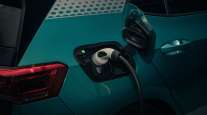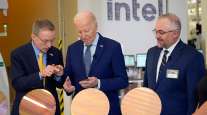Bloomberg News
VW Raises Full-Year Outlook, Warns of Growing Chip Shortage

[Ensure you have all the info you need in these unprecedented times. Subscribe now.]
Volkswagen AG raised its earnings outlook after a strong start to the year, while cautioning that the semiconductor shortage rippling through the industry will become more pronounced in the second quarter.
Operating return on sales is forecast at 5.5% to 7% this year, compared with a previous range of 5% to 6.5%, Europe’s largest automaker said May 6 in a statement. VW also raised its projection for net cash flow and net liquidity.
“We started the year with great momentum and are on a strong operational course,” Chief Executive Officer Herbert Diess said in the release.
RELATED: Raimondo Calls for Surge in Chip Production
While demand has rebounded across the industry, manufacturers are now grappling with an acute chip shortage that’s forcing them to halt production lines and prioritize some vehicles. Diess said the company will feel more pain in the second quarter and that some lines will stop “for a few days, a few weeks,” though the fallout won’t be as pronounced as with some rivals.
VW shares reversed initial gains and traded down 2.5% in Frankfurt, valuing the manufacturer at $145 billion (120.6 billion euros).
Daily Battle
Stellantis NV warned this week that the global semiconductor shortage will deteriorate further from the first three months of the year, while Ford Motor Co. has forecast a $2.5 billion hit to earnings from scarce chip supplies.
“We’re fighting day by day,” Diess said in an interview with Bloomberg TV. “We’re doing everything to keep production running.”
Still, the fallout from the disruptions might lower VW’s second-quarter return on sales to about 5%, down from 7.7% in the first three months, he said during a call with analysts.
VW is at a pivotal moment in getting its electric-car push off the ground and in trying to narrow the gap to Tesla Inc. Among the new models this year are the VW ID.4 and the Audi Q4 e-tron, two crossovers about the size of Tesla’s popular Model Y, as part of the industry’s largest rollout of electric cars. Diess said that electric vehicles are actually less affected by the chip shortage, supporting the company’s efforts to tilt production more into that space.
Two months after mapping out plans to build six battery factories in Europe, VW is still in talks with potential partners and governments over possible partnerships to finance the projects. Decisions could be made “in the next couple of months” and include initial public offerings of “some of the activities,” Diess said.
RELATED: Caterpillar Says Chip Shortage May Hurt Equipment Deliveries
First-quarter operating profit surged to 4.8 billion euros from 900 million euros last year, when the COVID-19 pandemic shuttered showrooms and factory floors. The group’s Audi and Porsche premium brand continued to be largest profit contributors, accounting for just over half of the group’s earnings with 2.58 billion euros combined.
The German carmaker targets becoming the global EV leader by 2025 at the latest and is allocating substantial financial and management firepower to boost software expertise under a new unit named Cariad. VW’s shares have soared since Diess wooed investors in March with back-to-back briefings on standardizing key technologies across VW’s 12 brands for scale effects that’ll likely elude both Tesla and established automakers.
Steel Prices
The recovery in demand is helping to fuel VW’s costly electric plans. Total deliveries during the first quarter jumped 21% to 2.43 million vehicles, mainly driven by a surge in China. Deliveries of electrified models more than doubled to 133,300 vehicles, of which 59,900 were battery-electric vehicle and the remainder plug-in hybrids.
The Wolfsburg-based manufacturer has targeted selling roughly 600,000 purely battery-powered cars this year and is “fully on track” to comply with tightening European emission rules, Diess said.
Besides the semiconductor shortage, rising prices for raw materials from steel to precious metals are also taking their toll on the car industry, Diess said. “Finding new sources, that’s going to be a challenge for 2021 for sure,” Diess said. “Demand is rising for everyone, and supply is constrained.”
Want more news? Listen to today's daily briefing below or go here for more info:




